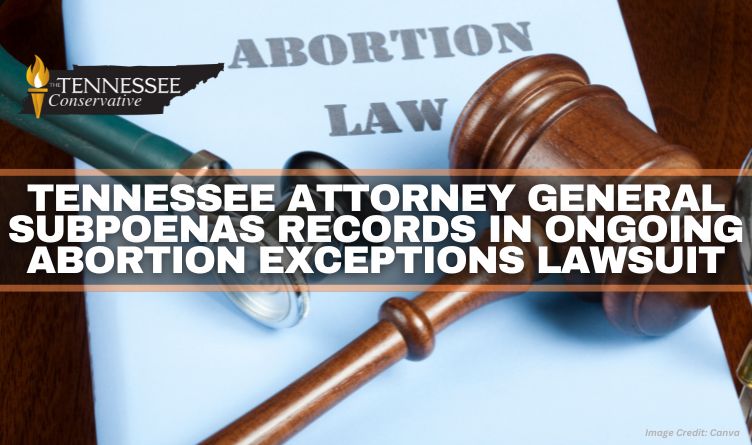Image Credit: Canva
The Tennessee Conservative [By Paula Gomes] –
As part of an ongoing lawsuit, Tennessee Attorney General Jonathan Skrmetti’s office has subpoenaed abortion records dating back to 2022 from four medical groups within the state.

Vanderbilt University Medical Center, an Ascension hospital, and two smaller medical practices in Franklin are being asked to turn over information about abortions that may have been provided, including the number of abortions performed since 2022. Some of the subpoenas are requesting communications and all documents related to the abortions.
All providers involved are legally allowed to preserve the patient confidentiality of the records they submit and additionally, a protective order has been issued that will block their use from being used for investigation beyond the scope of the lawsuit.
The lawsuit brought by several Tennesseans, both patients and doctors, with the support of a pro-abortion group in 2023 seeks to expand Tennessee’s abortion exceptions.

While the law permits the procedure during medical emergencies, the litigants say they were denied “medically necessary abortions”.
One of the women, Allie Phillips, was recruited by the Center for Reproductive Rights after her TikTok videos got their attention.
Phillips has said that she was not able to get an abortion after the devastating news that her daughter Miley Rose would not survive because of Tennessee law. When Phillips received the sad news at a 19-week anatomy scan, that her daughter had multiple fetal anomalies not compatible with life, she says the doctor gave her two choices: Continue her pregnancy, or terminate, but to do the second she would have to travel out of state.
Phillips ultimately chose to travel to New York with her husband to terminate her pregnancy, a week after the diagnosis, where she learned that her baby had already died in utero.
Phillips says that common procedures such as D&C after a baby dies in the womb is the same as getting an abortion but Tennessee law specifically states that this type of healthcare is permitted.
Under state law, abortion means “the use of any instrument, medicine, drug, or any other substance or device with intent to terminate the pregnancy of a woman known to be pregnant.” The law does not prohibit procedures that “remove a dead fetus.”
The fact is that the very procedure that Phillips underwent in New York after learning her child had died would also have been legal in Tennessee had she stayed in the state and discovered the news of her child’s passing at home.

Abortion activists have tried to scare women all across the country by saying that procedures like D&Cs are the same as abortion and that women will have to continue carrying dead babies or endure ectopic pregnancies in states where abortion is now outlawed. This is absolutely not true.
While some abortions do use the same procedures performed in a D&C, the difference is that in a D&C, the child has already died, whereas in an abortion, the procedure takes place while the child’s heart is still beating.
Lawyers representing the state have argued that the abortion exceptions do not need to be reworked just because some doctors have failed to accurately interpret the law. The Tennessee General Assembly passed a bill earlier this year that sought to clarify circumstances under which women may access an abortion.
The lawsuit is asking the state court to issue a declaration about when doctors can legally provide an abortion and to establish that medical providers are allowed to decide when such procedures fall within the standard of care in treating a high-risk or complicated pregnancy with the mental health of the patient allowed to be a determining factor.

In 2024, a three-judge all female panel – Nashville Chancellor Patricia Head Moskal, 10th Judicial District Judge Sandra Donaghy, and 25th Judicial District Chancellor Kasey Culbreath – ruled that doctors within the state that provide emergency abortions will not face discipline by the medical board or have their licenses revoked.
The panel ruled that certain pregnancy-related conditions qualify as medically necessary exceptions, conditions that Skrmetti said were already covered.
The law already explicitly stated that ectopic or molar pregnancies qualify as exemptions as well as doctors using their “reasonable medical judgment” to prevent a mother’s death or a “serious risk of substantial and irreversible impairment of a major bodily function.”

About the Author: Paula Gomes is a Tennessee resident and reporter for The Tennessee Conservative. You can reach Paula at paula@tennesseeconservativenews.com.


